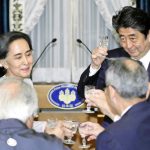Abe vies with China for influence over ASEAN gateways

The warm welcome afforded Myanmar’s de facto leader, Aung San Suu Kyi, here on November 2 underscores Japanese Prime Minister Shinzo Abe’s eagerness to counter Chinese overtures to a country, like the Philippines, of great geopolitical importance in Southeast Asia. Abe greeted Suu Kyi at the State Guest House, normally reserved for foreign heads of state or government — such as Philippine President Rodrigo Duterte, who visited Japan last week. He opened the meeting with enthusiasm, expressing a hope of making “great strides” in developing bilateral relations by working with her. Abe had put forth a new diplomatic initiative for “free and open” Indian and Pacific oceans in August. In an unspoken rebuke to China’s maritime expansion, he laid out a vision of the oceans connecting Asia to Africa as “peaceful seas that are governed by the rule of law.”

